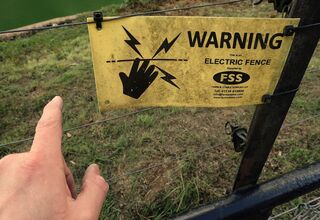Neuroscience
Need to Know: How Curiosity Drives Risky Behavior
People will risk physical harm just to find out what will happen. Why?
Posted December 16, 2020 Reviewed by Devon Frye

“I wonder what would happen if…”
Most of the great discoveries of human history have been preceded by these words, but then again, so have countless trips to the emergency room. I had a friend in middle school who was forever uttering this phase, and the experiment that followed very often ended in personal injury, or, at the very least, damage to personal property. “I wonder what would happen if I put a banana in the tailpipe of my dad’s car,” he would say. Or “…if I threw a can of spray cheese into the fireplace.” Or, on one particularly memorable occasion, “…if I used a bedsheet as a parachute and jumped off the roof of the house” (fortunately, only one story).
A slightly more cautious youth, I would typically step in shortly after the words came out of his mouth to ask him if he really thought it would be a good idea to turn his hypothetical question into a physical reality. Occasionally I managed to divert his attention to some safer, if admittedly less interesting activity, but more often than not he would insist on pursuing his investigation to the bitter end, regardless of the consequences. “I just have to find out,” he would say, as a final argument to end all further discussion on the matter.
While my middle school friend was perhaps unusual in his willingness to risk life and limb to test out the questions that were continually popping into his head, there was nothing at all extraordinary in his basic desire “to find out.” We human beings are curious creatures. The history of human civilization, in fact, is a testimony to our basic need to find out. We have examined virtually every inch of the world we live in, and mapped fifteen billion light-years of the universe that surrounds it. Our curiosity is a fundamental part of who we are as a species.
To find out just how fundamental is this human need to know, a team of researchers recently conducted a study in which participants were given the opportunity to risk the possibility of electric shock in exchange for satisfying their curiosity over “trivial” knowledge (of “no apparent instrumental value”). The results indicated that our human urge to satisfy our curiosity is so powerful that we are willing to endure the risk of physical pain in order to do so. The study also suggested that to call our insatiable curiosity a “hunger” for knowledge is not entirely metaphorical, since the participants’ motivation to satisfy their curiosity shared both psychological and neural common ground with physical hunger.
In the study, participants were presented with a “curiosity condition” in the form of either video clips of magic tricks or trivia questions, followed by a “wheel of fortune” that depicted the probability of their either winning or losing. “Winning” involved the chance to be shown how the magic trick was performed or what the answer to the trivia question was. “Losing” involved the possibility of receiving an electric shock (participants were not actually shocked at the end of losing rounds; they only believed that they would be). Faced with these options, they were then required to decide whether or not they were willing to gamble for the chance to have their curiosity satisfied. Another part of the experiment involved a “food condition” in which participants were shown pictures of food, and then asked to decide whether or not they were willing to gamble for the chance to receive pictured food items, once again with the prospect of possible electric shock as a result of losing.
Not surprisingly, participants’ willingness to gamble decreased as the odds of losing, and receiving an electric shock, increased—but up to a point, they were willing to accept the prospect of receiving an electric shock in order to have their curiosity about the magic trick or the trivia question satisfied. Furthermore, when compared to their responses to the food condition, participants showed an equal willingness to risk electric shock to satisfy either curiosity or physical hunger. The results suggest that humans are just as willing to risk physical discomfort to acquire knowledge when we are curious as we are to acquire food when we are hungry.
To test the hypothesis that there may be neural as well as behavioral connections between curiosity and hunger, the researchers conducted a pair of neuroimaging experiments in which fMRI scans were taken of participants’ brains as they deliberated over the decision of whether or not to risk electric shock to satisfy their curiosity/hunger. The scans revealed that both types of motivated decision-making involved a region of the brain associated with reward: “Specifically, activation in the ventral striatum in response to curiosity- and hunger-evoking stimuli predicted the decision to accept the risky option through the activation of the dorsal striatum during the decision phase.”
The study reveals the enormous power that curiosity exerts as a motivating force in human behavior, driving us, even at the risk of personal harm, to satisfy our need to know in much the same way that hunger drives us to satisfy our need to eat. It is what drove my middle-school friend to risk punishment from his parents or a trip to the emergency room just to see what would happen if… It is also what has produced the greatest achievements of human civilization in our past, and what will allow us to tackle the greatest challenges that face us in our future.
References
Lau, Johnny King L., Hiroki Ozono, Kei Kuratomi, Asuka Komiya, and Kau Murayama. “Shared Striatal Activity in Decisions to Satisfy Curiosity and Hunger at the Risk of Electric Shocks.” Nature News, Nature Publishing Group, 30 Mar. 2020, www.nature.com/articles/s41562-020-0848-3.


